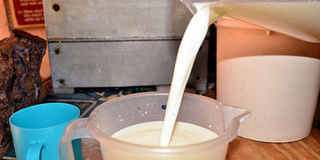Intensify crackdown on raw milk peddling for safety, food security

Consumption of raw milk can cause serious food poisoning. PHOTO | FILE | NATION MEDIA GROUP
What you need to know:
- Unprocessed milk from cows, sheep, goats and camels consumed on the farms and sold through local vendors exceeds 2.4 billion litres a year.
- The large processors should provide incentives for farmers to sell milk directly to them under contract instead of dumping it in the raw market.
It’s not enough for the Kenya Bureau of Standards (Kebs) to stop the sale of peanut butter, sugar, maize and other foods that it has declared unfit for human consumption because the manufacturers have failed to observe the prescribed minimum quality standards.
Manufacturers and sellers of potentially harmful foods should be prosecuted and, if allowed to mend their ways and remain in business, subjected to rigorous quality controls to stop abuse of health and safety standards.
The crackdown should also be intensified and extended to all foods, starting with the ones that pose the highest risk to mass consumers — such as milk and other dairy products.
Milk is widely consumed globally for its high nutritional value, including dietary energy, proteins and fats.
VULNERABILITY
Moreover, the dairy industry is among the most important agricultural activities due to its contribution to food and nutrition security, incomes and employment.
As in many other countries, the alarm for Kenya is the high consumption of raw or unpasteurised milk peddled across the country, mostly by small-scale vendors.
In a good year, our dairy industries process over 500-600 million litres of milk. They processed 568.4 million litres by November, show data by Kenya National Bureau of Statistics.
But processed milk accounts for just 20 percent of the national milk production. That means unprocessed milk from cows, sheep, goats and camels consumed on the farms and sold through local vendors exceeds 2.4 billion litres a year.
CONTAMINATION
These numbers illustrate how much Kenyans are exposed to high risk of harmful bacteria and other germs found in unpasteurised milk.
Moreover, the risk of contamination increases during handling because raw milk is distributed and sold in open containers that are mostly not sterilised.
Contamination of milk with aflatoxins and antibiotics from animal feed and drugs also raise quality and safety concerns.
Studies by health experts, including by the United States' Centers for Disease Control (CDC), show consumption of raw milk can cause serious food poisoning or even fatal foodborne diseases.
This is dangerous, particularly for infants, children, older people and consumers with suppressed immunity.
SAFETY
While consumers have a primary responsibility to beware of what they consume, it’s incumbent upon the government to protect them by ensuring that only safe food is manufactured and sold.
All the government agencies involved in food health and safety should step up their efforts to enforce compliance and weed out unscrupulous operators.
Kebs should join hands with the Kenya Dairy Board to enforce the prescribed health and safety standards.
The milk industry is a major employer and should be harnessed to increase employment opportunities for the youth along the value chain.
The large processors should provide incentives for farmers to sell milk directly to them under contract instead of dumping it in the raw market.
That will encourage producers to improve the quality of their milk and increase their incomes.
SUPPORT
Smallholder producers and distributors need support through capacity building to sanitise their systems.
They should be encouraged to improve their value chains to graduate from the informal market and offer safe and better quality products.
Increasing the volume of processed milk would reduce consumption of contaminated milk while increasing opportunities for jobs and incomes for all industry players.
Addressing the weaknesses of the milk industry can enhance its potential and contribute to the ‘Big Four Agenda’ on food security and manufacturing.
It would also improve prospects for universal health coverage by reducing health risks and costs arising from consumption of unpasteurised and contaminated milk and milk products.
Mr Warutere is a director of Mashariki Communications Ltd. [email protected]





